| Srl | Item |
| 1 |
ID:
051909
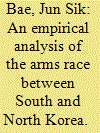

|
|
|
| 2 |
ID:
050277
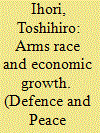

|
|
|
| 3 |
ID:
166748
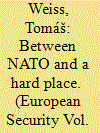

|
|
|
|
|
| Summary/Abstract |
Defence spending has become a primary issue in the context of NATO. The question of fair burden-sharing and development of new capabilities in reaction to the changing security environment led NATO members to aim to spend 2% of GDP on defence by 2024. While some allies have managed to reach the level quickly, others seem not to be able or willing to do so. We know little, however, how the international commitment is reflected and referred to in individual member states. This article shows how size played a role when the 2% pledge was discussed in domestic politics, even if the resulting policy may be very similar. Based on expert and political debates in Germany and Czechia, it demonstrates that external expectations and the question of status play a crucial part in the small state’s reasoning whereas it is mainly internal drivers that shape the big state’s decisions.
|
|
|
|
|
|
|
|
|
|
|
|
|
|
|
|
| 4 |
ID:
111807
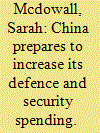

|
|
|
| 5 |
ID:
080087
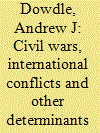

|
|
|
|
|
| Publication |
2007.
|
| Summary/Abstract |
Previous research on African military spending suggests the existence of civil strife as the best predictor of high levels of military spending. However, little is known about why some African nations maintain strong 'auxiliary' or paramilitary organizations while others do not. This study finds that the presence of civil or interstate war does not strengthen reserve or irregular forces. Civilian governments promote strong paramilitary organizations to counter any threat the regular military might pose to regime survivability as a form of clientelist politics
|
|
|
|
|
|
|
|
|
|
|
|
|
|
|
|
| 6 |
ID:
144119
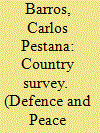

|
|
|
|
|
| Summary/Abstract |
This paper is a survey of Angola’s defence sector and policy from 1992, the year the civil war ended, to 2012. Angola achieved its independence upon the Popular Movement for the Liberation of Angola (MPLA) defeating National Union for the Total Independence of Angola. Since then, fuelled by its rich natural resources, the country has grown steadily. The MPLA military forces were a central factor behind independence and maintain their central role to this day. Moreover, Angola’s support for African peace with monitoring military missions is a clear indication that the country aims to intervene in African security and military issues, with its military capabilities funded by oil revenues.
|
|
|
|
|
|
|
|
|
|
|
|
|
|
|
|
| 7 |
ID:
185495
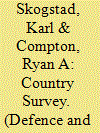

|
|
|
|
|
| Summary/Abstract |
This paper provides an overview of the Canadian defence sector following the Cold War. A review of Canadian defence policy in this period indicates that, though the mission of the Canadian military did not change, fiscal realities forced severe restrictions on the size and capabilities of the organization. Comparisons between Canada and other G7 NATO nations indicate that throughout this period, Canada has consistently devoted fewer resources to the military than its allies. A review of Canada’s defence industrial base and defence policy indicates that this limited funding has led to a small and uncompetitive defence sector in the Canadian economy. Lastly, a regression analysis of Canada’s defence spending is undertaken which reveals that domestic economic variables are the primary determinant of Canadian defence spending during this period.
|
|
|
|
|
|
|
|
|
|
|
|
|
|
|
|
| 8 |
ID:
113330
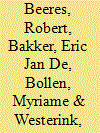

|
|
|
|
|
| Publication |
2012.
|
| Summary/Abstract |
This article examines the pattern of expenditures for national security of the Netherlands from 1990 until 2009. In 1990, military spending amounted to 2.7% of Gross Domestic Product (GDP). In 2009, almost two decades later, this ratio dropped by more than a full percent. During this period, the reduction of funds available for national security was in concurrence with the Dutch government's spending policies. The Netherlands Armed Forces (NAF) changed dramatically in terms of capabilities, size, equipment and personnel in this two-decade time span. Our investigative results indicate that in spite of this transition, no significant changes have been implemented since 1990 in how the Dutch defence budget is allocated for the Navy, Army and Air Force. Furthermore, the mix of expenditures for salaries, operations and maintenance, as well as those for capital investment, stayed roughly the same for the duration of the period studied.
|
|
|
|
|
|
|
|
|
|
|
|
|
|
|
|
| 9 |
ID:
055070
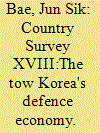

|
|
|
| 10 |
ID:
128835
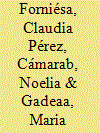

|
|
|
|
|
| Publication |
2014.
|
| Summary/Abstract |
The propensity of cutting some government spending during the crisis time generates the incentive for some policy-makers and governments to modify certain expenses irrespective to output variations. The goal of this paper is to analyse the cyclical properties of defence expenditure in Spain (1978-2009) and to characterize the consequences of economic and political cycles on this public spending.
|
|
|
|
|
|
|
|
|
|
|
|
|
|
|
|
| 11 |
ID:
080648
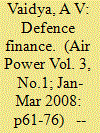

|
|
|
| 12 |
ID:
116060
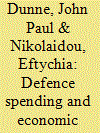

|
|
|
|
|
| Publication |
2012.
|
| Summary/Abstract |
Over the last 30?years, there has been an impressive amount of empirical work on the defence-growth nexus, using different methodologies, models and econometric techniques and focusing on individual case studies, cross-country studies or panel data studies. Despite the number and the variety of studies, the evidence on the defence-growth relationship is still far from conclusive. Rather surprisingly, very limited work has been published in the relevant literature for the European Union despite the continuous discussions for a Common European Defence Policy that would require an assessment of the economic effects of defence in this region. To fill in the gap in the literature, this paper employs an augmented Solow-Swan model and estimates it both with panel and time series methods to provide empirical evidence on the economic effects of defence spending in the EU15 over the period 1961-2007. Overall, evidence derived from both panel and time series methods is consistent and suggests that military burden does not promote economic growth in this region.
|
|
|
|
|
|
|
|
|
|
|
|
|
|
|
|
| 13 |
ID:
147497
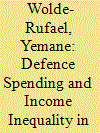

|
|
|
|
|
| Summary/Abstract |
The rising trend in income inequality has recently attracted a renewed interest in the determinants of this growing trend across many countries. This article adds to the debate by investigating the impact of defence expenditure as a possible determinant of inequality in Taiwan, a country once was considered to be a poster child of an equitable growth, but now income inequality has become one of the Taiwan’s growing challenges. Applying the bounds test approach to cointegration and four long-run estimators for the period from 1976–2011, we found a long-run relationship between the various measures of inequality and defence expenditure where defence expenditure exerts a positive and a statistically significant impact on the worse income inequality in Taiwan. Further application of the lag-augmented causality test procedure also reveals a unidirectional causality running from defence expenditure to income inequality with defence expenditure causing income inequality to rise.
|
|
|
|
|
|
|
|
|
|
|
|
|
|
|
|
| 14 |
ID:
076958
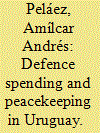

|
|
|
|
|
| Publication |
2007.
|
| Summary/Abstract |
Uruguay is a country with a very unusual profile, since it has just 3.4 million inhabitants but is among the top ten troop contributors to the UN PKO (Peace Keeping Operations) and is the first contributor per capita. In 2002 and 2003 it was the seventh troop contributor to the UN, and by the end of 2005 it was eighth in the UN ranking. Uruguay has never had any imminent external threat to its security after its independence in 1828, and it has had no internal threat since the end of the urban guerrillas' actions in the 1970s. The country has no defence industry, and has always had an all-volunteer military service, which presently involves almost 1% of the total population, and about 2% of the labour force. The empirical evidence presented in this paper shows that, in the past decades, Uruguayan defence spending has been influenced mainly by internal factors, most of them of an economic nature. The high participation in PKO has not increased military expenditure and it has produced a positive impact on the country's economy
|
|
|
|
|
|
|
|
|
|
|
|
|
|
|
|
| 15 |
ID:
167860
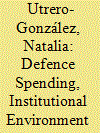

|
|
|
|
|
| Summary/Abstract |
This paper analyses the impact of participating in a military alliance on the nexus between defence spending and economic growth. In particular, we study how the process of gradual association to a military organization influences the defence spending of newcomers, and consequently their economic growth. Conclusions from the theoretical model are tested empirically for countries in the North Atlantic Treaty Organization. Results show that the prospect of intensified military alliance partnership and membership has a positive effect on economic growth. In addition, increased security and stability gained by closer military cooperation reinforces the positive link with economic growth. Empirical evidence supports theoretical priors.
|
|
|
|
|
|
|
|
|
|
|
|
|
|
|
|
| 16 |
ID:
091728
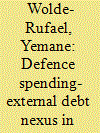

|
|
|
| 17 |
ID:
059273
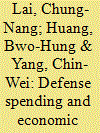

|
|
|
| 18 |
ID:
124888
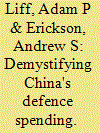

|
|
|
|
|
| Publication |
2013.
|
| Summary/Abstract |
China's limited transparency concerning its defence spending harms strategic trust, but foreign analysts often lose sight of important realities. Specific details remain unclear, but China's defence spending overall is no mystery - it supports PLA modernization and personnel development as well as its announced objectives of securing China's homeland and asserting control over contested territorial and maritime claims, with a focus on the Near Seas (the Yellow, East, and South China seas). This article offers greater context and perspective for Chinese and Western discussions of China's rise and concomitant military build-up through a nuanced and comprehensive assessment of its defence spending and military transparency.
|
|
|
|
|
|
|
|
|
|
|
|
|
|
|
|
| 19 |
ID:
119263
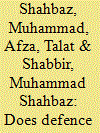

|
|
|
|
|
| Publication |
2013.
|
| Summary/Abstract |
This study revisits the relationship between defence spending and economic growth via a Keynesian model in Pakistan using the autoregressive distributive lag bounds testing approach to cointegration. Empirical evidence suggests a stable cointegration relationship between defence spending and economic growth. An increase in defence spending reduces the pace of economic growth confirming the validity of Keynesian hypothesis in this case. Current economic growth is positively linked with economic growth of previous periods while a rise in non-military expenditures boosts economic growth. Interest rate is inversely associated with economic growth. Finally, unidirectional causality running from military spending to economic growth is found.
|
|
|
|
|
|
|
|
|
|
|
|
|
|
|
|
| 20 |
ID:
121748
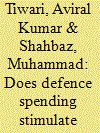

|
|
|
|
|
| Publication |
2013.
|
| Summary/Abstract |
This study reinvestigates the effect of defence spending on economic growth using Zivot and Andrews and Lee and Strazicich, structural unit root tests and the autoregressive distributed lag bounds testing approach to cointegration in augmented version of Keynesian model for India. Study confirmed long run relationship among variables studied show that economic growth is positively affected by defence spending (also negative impact after a threshold point), investment and trade openness while negatively by interest rate. Granger causality analysis revealed bidirectional causal relationship between defence spending and economic growth as probed by variance decomposition approach.
|
|
|
|
|
|
|
|
|
|
|
|
|
|
|
|